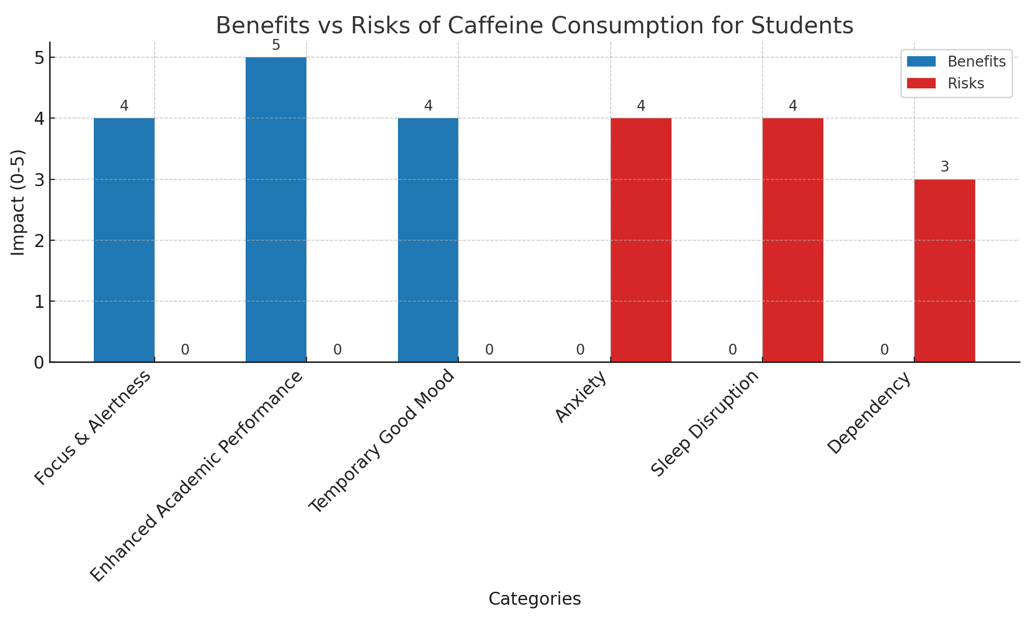What are the effects of caffeine on student stress and anxiety?
In the high-stress environment of academic life, caffeine is a popular choice for students needing a mental boost. But what are the effects of caffeine on student stress and anxiety? This article explores caffeine's impact on academic performance and mental well-being to help students make informed choices.
11/8/20246 min read
The high-stress environment of academic life, caffeine is often a lifeline for me. I rely on it to stay alert, study for extended hours, and manage the demands of exams and coursework. Yet, while caffeine can enhance my wakefulness, it also has an impact on my mental well-being. What are the effects of caffeine on my stress and anxiety? This question is particularly relevant for me as I navigate the fine line between academic performance and mental health. Understanding caffeine's effects on my stress and anxiety levels can help me make more informed choices about my caffeine consumption.
For students, the demands of balancing study and social life and managing time already create significant pressure for me, often resulting in elevated stress and anxiety. When I add caffeine to the mix, its stimulant effects may initially give me the alertness I need to complete assignments and stay focused. But studies show it can also increase my cortisol levels, potentially making my stress worse over time.
Beating exam anxiety becomes even more challenging when I consume a lot of caffeine. The stimulating properties can increase my heart rate and lead to feelings of restlessness, especially since I'm prone to anxiety. For students like me dealing with the impact of stress on mental health, caffeine can sometimes intensify my nervousness and interfere with my sleep, which is essential for both cognitive function and stress management.
Finally, understanding the role of physical activity in reducing student stress may offer me a healthier alternative or complement to caffeine for staying alert and managing my stress. Regular exercise has been shown to release endorphins, which naturally alleviate my stress and improve my mood without the crash or anxiety spikes associated with caffeine. With a thoughtful approach to caffeine use, I can find a balance that supports my academic performance while preserving my mental well-being.
This nuanced view on caffeine helps me consider all factors in my stress management strategies, aiming for success in a way that supports my mental and emotional health throughout my academic journey.
What Are the Effects of Caffeine on Student Stress and Anxiety?
Caffeine's effects on student stress and anxiety are both beneficial and potentially harmful. While moderate caffeine intake can improve focus, excessive consumption may lead to heightened stress and amplified anxiety symptoms. As a student already facing high academic pressures, caffeine's additional impact on mental health can be significant.


How Caffeine Affects the Central Nervous System
Caffeine primarily acts as a stimulant for my central nervous system by blocking adenosine receptors. Normally, adenosine helps regulate my sleep by promoting tiredness.
By blocking this mechanism, caffeine keeps me more alert and awake. But this action also increases the release of dopamine and norepinephrine, neurotransmitters associated with heightened alertness and the "fight or flight" response.
For me under stress, this artificial stimulation can exacerbate my feelings of anxiety and restlessness, especially if I have a lot of it.


Short-Term Boost vs. Long-Term Anxiety
I often turn to caffeine for its immediate benefits: it can improve my alertness, concentration, and even mood. A small or moderate amount can be helpful during a late-night study session or in preparing for exams.
But studies show this boost is often followed by a "crash," which can make me feel more fatigued or anxious than before. A meta-analysis found that while low doses (around 50-200 mg) generally provide a mild increase in my focus, doses above 400 mg per day significantly increase the likelihood of my anxiety, jitteriness, and nervousness.
Why Students Rely on Caffeine
For many students like me, caffeine is a daily necessity. It serves as a tool to enhance my academic performance and a coping mechanism for my stress. Surveys show my caffeine intake often rises during exams and other high-stress academic periods.
The appeal of caffeine is its ability to give me a quick energy boost and temporarily improve my cognitive performance.
But this comes with trade-offs. Over time, I may develop a caffeine dependence, needing higher doses to achieve the same alertness, which leads to a cycle of dependence and increased stress as I struggle to function without my usual dose.
Caffeine, Anxiety, and the "Caffeine Crash"
One lesser-known effect of caffeine on my stress and anxiety is the "caffeine crash." After the stimulant effect wears off, I often experience fatigue, irritability, and even increased anxiety.
My body's adenosine receptors, previously blocked, flood back into action, creating a sudden sense of exhaustion.
This crash can be particularly distressing for me if I rely on caffeine for prolonged study sessions, leaving me feeling worse than before.


The Link Between Caffeine and Sleep Disruption
Caffeine's impact on my sleep is a well-documented factor that directly influences my stress and anxiety. By delaying my sleep, caffeine can lead to shorter, lower-quality sleep, which then heightens my stress and reduces my brain's ability to cope with anxiety.
Research shows that students who consume caffeine late in the day are more likely to have difficulty falling and staying asleep.
Poor sleep quality can worsen my symptoms of stress and anxiety, leading to a feedback loop where I consume more caffeine to stay awake, ultimately exacerbating my overall stress levels.
Sleep Deprivation and Mental Health
Sleep plays a crucial role in my mental health, especially as a student who relies on rest to consolidate memory and recharge.
Studies suggest that sleep deprivation not only impairs my cognitive performance but also reduces my brain's ability to process stress and manage emotions effectively.
A study found that college students who consumed caffeine six hours or less before bedtime had significantly more fragmented sleep, impacting their ability to manage stress during the day.
Genetic Factors and Sensitivity to Caffeine
Not all students experience caffeine's effects the same way. Genetic differences influence how my body metabolizes caffeine and responds to its stimulating effects. Some individuals have a faster metabolism and can tolerate higher doses with minimal anxiety, while others like me are more sensitive and may feel heightened anxiety even with small amounts.
These genetic variations are often linked to differences in adenosine receptor expression, making certain students more prone to caffeine-induced stress. For students aware of their heightened sensitivity, adjusting caffeine intake can be essential for managing stress and mental health.
Strategies for Students to Manage Caffeine Intake
To make the most of caffeine's benefits without triggering excessive anxiety, I can adopt several strategies:
· Limit my intake to moderate levels. The general recommendation is to keep daily caffeine intake below 400 mg (about four cups of coffee). Higher doses increase the likelihood of my anxiety, jitteriness, and dependence.
· Avoid caffeine in the afternoon and evening. Caffeine consumed later in the day is more likely to disrupt my sleep, leading to increased stress the following day. Opting for decaf or herbal teas can help maintain my sleep quality.
· Monitor for anxiety symptoms. If I notice my heart rate increasing, feeling jittery or nervous after having caffeine, I may benefit from reducing my intake.
· Stay hydrated. Dehydration can worsen the effects of caffeine and lead to additional stress. Drinking plenty of water can help reduce this risk.
· Gradually reduce caffeine dependence. For students like me who consume large amounts daily, gradually reducing caffeine intake over time can minimize withdrawal symptoms like headaches and fatigue.
Weighing the Benefits and Risks
As a student, I need to consider both the potential benefits and risks of consuming caffeine.
When consumed in moderation, caffeine can enhance my focus, alertness, and academic performance. But these advantages may come at the cost of increased anxiety, sleep disruption, and heightened dependency.
By remaining mindful of my individual tolerance levels and paying attention to any signs of caffeine-related stress, I can strike a balance that supports both my academic and mental well-being.
Conclusion
What are the effects of caffeine on my stress and anxiety as a student? While caffeine can be a useful tool for short-term energy boosts and improved focus, its prolonged use may exacerbate my symptoms of stress and anxiety, especially if I'm highly sensitive.
By understanding my own tolerance, regulating my intake, and prioritizing healthy sleep habits, I can mitigate these effects. Finding this balance allows me to harness caffeine's benefits without compromising my mental health.
For the readers who would like to go go deeper into the subject, following articles are advised:
